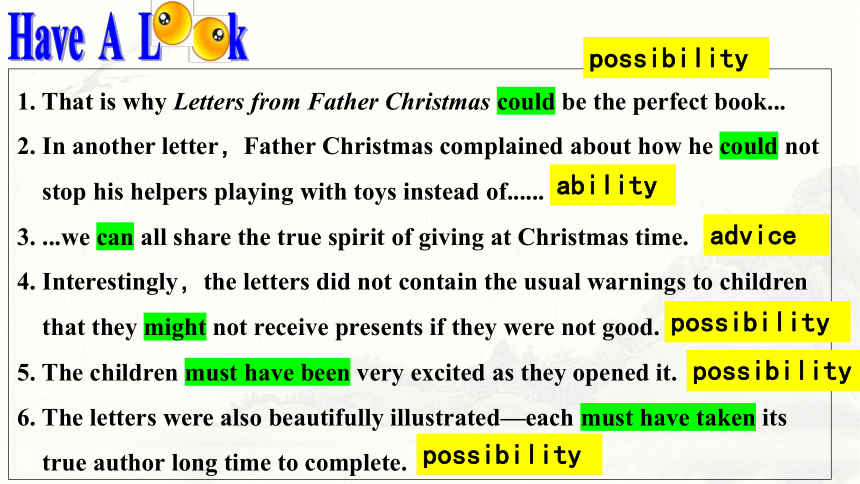(
课件网) 1. That is why Letters from Father Christmas could be the perfect book... 2. In another letter,Father Christmas complained about how he could not stop his helpers playing with toys instead of...... 3. ...we can all share the true spirit of giving at Christmas time. 4. Interestingly,the letters did not contain the usual warnings to children that they might not receive presents if they were not good. 5. The children must have been very excited as they opened it. 6. The letters were also beautifully illustrated—each must have taken its true author long time to complete. possibility ability advice possibility possibility possibility Grammar:Modals UNIT 2 Let’s Celebrate 情态动词(Modals)用来表示说话人的某种语气,情感或态度,如:可能性,意愿,猜测,义务,建议,命令,请求等。情态动词本身具有一定的词义。常见的情态动词包括can (could), may (might), will (would), shall (should), ought to,had better, must, have to,need, dare, used to等。 本单元主要讲情态动词:can,could,may,might,must. 1. 基本特征: (1)情态动词不能单独做谓语,后面接动词原形; (2)情态动词没有单数的变化(be able to,have to除外) 2. 基本用法: can,could may,might must 一:情态动词表推测(possibility) 情态动词must, can, could, may, might等都有表推测的用法,都可以对过去,现在或将来的情况是否发生做出语气强弱不同的推测。 1.现在或将来:情态动词+动词原形 2.过去:情态动词+have done 1. 在肯定句中表推测: (1) You must tell lies. 情态动词+动词原形(对现在/将来的推测) (2) He could be at home. He may be at home. He might be at home. could, may, might语气依次减弱,表示“可能, 也许”。 must语气最强, 表示“一定”; (非常肯定) (很可能) (可能) (或许, 不确定) 2. 在否定句中表推测: (1) It can't snow in summer. may not,might not语气较弱,表示“可能不”; mustn’t表示“禁止”,不用于否定推测。 (2) We might not go anywhere. You mustn't park your car here. can’t, couldn’t语气较强,表示“不可能”; 形式 用法 must have done 过去一定做过 can’t/ couldn’t have done 过去不可能做过 may/might have done 或许/可能做过某事 情态动词+have done(对过去的推测) 1.From what you said, she must have told you all about it. 从你所说的来看, 她一定把一切都告诉你了。 2. He can’t have finished the task in such a short time. 他不可能在如此短的时间内完成这项任务。 3.They might have given up that plan,but I am not sure. 他们可能已经放弃了那个计划,但是我也不确定 用适当的情态动词填空。 (1) He _____ have forgotten it. I told him just now. (2) It’s too late; I think he _____have gone to bed. (3) Mary went home. She _____ have finished her work. can’t/couldn’t may/ might must could have done本来能够做某事但实际上没做 should(ought to) have done 本应该做某事但没做 shouldn’t(oughtn’t to) have done 本不应该做某事但做了 might have done本可以做某事但没做 needn’t have done本没有必要做某事但做了 情态动词+have done(用于虚拟语气) 1.You shouldn’t have told her the truth. 你本不该告诉她真相。 2.I could have given him some help, but I was busy then. 我本能 ... ...

